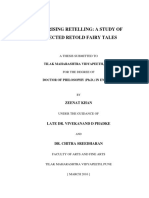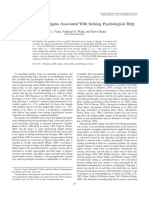Irish Folklore Portfolio 2
Irish Folklore Portfolio 2
Uploaded by
Alli WeilerCopyright:
Available Formats
Irish Folklore Portfolio 2
Irish Folklore Portfolio 2
Uploaded by
Alli WeilerOriginal Description:
Copyright
Available Formats
Share this document
Did you find this document useful?
Is this content inappropriate?
Copyright:
Available Formats
Irish Folklore Portfolio 2
Irish Folklore Portfolio 2
Uploaded by
Alli WeilerCopyright:
Available Formats
Irish folklore overcomes societal marginalization
Alli Weiler, March 18, 2013
Irish folklore is more self-expression and social critique than simple storytelling. Personal and passed down narratives offer exploited peoples the opportunity of an alternate history, free of stigma.
That is the view of Dr. Ray Cashman, associate professor at Ohio University and folklore expert.
Elon Universitys Program for Ethnographic Research and Community Studies (PERCS) brought Cashman to speak at the school Monday, March 18. Cashman primarily spoke about his recent work in Ireland with a storyteller there who, Cashman said, is using words to battle the marginalization associated with poverty.
Cashman told the audience about how the tension among various groups in Ireland is reflected in its traditional folklore, and he described a constant battle between religious, political and socioeconomic sects.
It is the natural thing for folklores to blame the high class for the low class struggles, he said, adding that the poor rely on their versions of spoken history to redeem the prejudice and stereotypes placed on them by their oppressors.
Cashman introduced James McGrath, or Packy Jim, the storyteller he met in Ireland, who first opened up Cashmans eyes to this breed of folklore.
He described Packy Jim as a bachelor who upholds Irish tradition both through his folklore and his impoverished way of life. Packy Jims lifestyle clashes with his neighbors. Cashman said they wish to distance themselves from the old, stigmatized living that he still represents.
Cashman said the neighbors anecdotes of Packy Jim referenced his eccentricities, laziness and selfishness. They believe his life to be easy.
Yet the neighbors praised Packy Jim as the keeper of Irish history.
The more folklores Packy Jim revealed to Cashman, the more Cashman learned to focus less on the lore and more on his uses for it.
Cashman referenced one story Packy Jim told him about the origination of angels. He eventually realized it to be a critique of the Irish compulsion to constantly create winners and losers in life. Cashman explained that Packy Jim felt that the Irish were always trying to outdo one another, or make the fool a bit foolier.
Cashman also spoke about how little Packy Jim told of his own past. In one of his few personal stories, Packy Jim eloquently presented a favorable persona of his younger self.
He doesnt boast about his young self but draws us in with his charming anxiety, Cashman reported. He charmed us with his self-deprecating, modest and lovable character. The intimacy of exposing the forgivable mistakes he made undermined the less charitable stories told about him by neighbors.
He said Packy Jim used his personal stories to push back at the stories that fueled the local economy of reputation.
Cashman said that Packy Jims versions of local folklore contain revisions. He works with old stories and recycles them to better comprehend his society and his role in it.
Juliana Swaren, an Elon freshman, identified with this part of Cashmans speech. Packy Jim truly employed Irish folklore as not only a means to have a say in society and history, but also his own personal role in it, she said.
Emma Luparello, also an Elon freshman, said, It is nice to see how his storytelling allows him to both connect and reason with his fellow Irish neighbors.
Cashman explained that it is people like Packy Jim who keep storytelling alive. Without voices recycling and reinventing stories, the marginalized masses might remain unheard. He said that storytelling would always be there as long as there are people in need and who remain open to it.
We would do well to learn to be attentive and to reconsider what we think we know, Cashman asserted.
You might also like
- (New Directions in Irish and Irish American Literature) Maureen E. Ruprecht Fadem (Auth.) - The Literature of Northern Ireland - Spectral Borderlands-Palgrave Macmillan US (2015)Document228 pages(New Directions in Irish and Irish American Literature) Maureen E. Ruprecht Fadem (Auth.) - The Literature of Northern Ireland - Spectral Borderlands-Palgrave Macmillan US (2015)John HarrisonNo ratings yet
- Thesis (P-530)Document303 pagesThesis (P-530)Houda Bours100% (1)
- Once Upon A Time in Cabramatta GuideDocument36 pagesOnce Upon A Time in Cabramatta Guidefake name lolNo ratings yet
- Ngataiharuru Taepa Te Tini A Pitau Catalogue - WEBDocument21 pagesNgataiharuru Taepa Te Tini A Pitau Catalogue - WEBRambhakt HanumanNo ratings yet
- National Mental Health Program (DOH)Document10 pagesNational Mental Health Program (DOH)Nicole Marin-Ching100% (1)
- Writing The Middle-Grade NovelDocument4 pagesWriting The Middle-Grade NovelsivaddsNo ratings yet
- Tradition, Genuine or Spurious (1984)Document19 pagesTradition, Genuine or Spurious (1984)canazoNo ratings yet
- Child Abuse in Pakistan Project PresentationDocument17 pagesChild Abuse in Pakistan Project PresentationRameeza Omair33% (3)
- A Case Study On DwarfismDocument6 pagesA Case Study On DwarfismGwen Caubang0% (1)
- EssayDocument9 pagesEssayddNo ratings yet
- Living Folklore: Unlimited Creativity: January 2019Document9 pagesLiving Folklore: Unlimited Creativity: January 2019teshomeNo ratings yet
- Bookwork: Medium To Object To Concept To Art: by Garrett Stewart (University of Chicago PRESS, 2011, $65)Document2 pagesBookwork: Medium To Object To Concept To Art: by Garrett Stewart (University of Chicago PRESS, 2011, $65)Mohamad Shoulah0% (1)
- BookArt BookVersion30OCT ARTHDocument22 pagesBookArt BookVersion30OCT ARTHazefghjcjg,No ratings yet
- Creative Writing: Short Stories: Definition of The Short StoryDocument6 pagesCreative Writing: Short Stories: Definition of The Short StoryCj BarongoNo ratings yet
- Neurath Wittgenstein SymposiumDocument69 pagesNeurath Wittgenstein SymposiumGerd Voodoo100% (1)
- Folklore As An Historical Science by Gomme, George LaurenceDocument189 pagesFolklore As An Historical Science by Gomme, George LaurenceGutenberg.orgNo ratings yet
- Ireland's Master Storyteller: The Collected Stories of Éamon KellyFrom EverandIreland's Master Storyteller: The Collected Stories of Éamon KellyNo ratings yet
- Beauty Standards in The American SocietyDocument13 pagesBeauty Standards in The American SocietyHafsa SmdNo ratings yet
- Literature Review The Effects of Comics As A Learning ToolDocument20 pagesLiterature Review The Effects of Comics As A Learning ToolhajraNo ratings yet
- Mccoy in CranbrookDocument3 pagesMccoy in CranbrookIsma EstévezNo ratings yet
- Design and WritingDocument3 pagesDesign and Writingmeghanwitzke7136No ratings yet
- Using Wordless Picture Books in The Classroom Teachers GuideDocument9 pagesUsing Wordless Picture Books in The Classroom Teachers GuideCandlewick PressNo ratings yet
- Linguistic Creativity Secondary Orality and Political DiscourseDocument27 pagesLinguistic Creativity Secondary Orality and Political Discoursebritr2002No ratings yet
- Creating Artists' Books: Sarah BodmanDocument13 pagesCreating Artists' Books: Sarah BodmanMaría Nieves GLNo ratings yet
- Kenneth HaltmanDocument5 pagesKenneth HaltmandiginoseNo ratings yet
- Angelas Ashes Essays 2Document26 pagesAngelas Ashes Essays 2api-376821317No ratings yet
- Practices LookingDocument129 pagesPractices LookingMay SayrafiNo ratings yet
- Advice To Storytellers Working in MuseumsDocument5 pagesAdvice To Storytellers Working in MuseumsTom GoodaleNo ratings yet
- The Proof of The ProverbDocument46 pagesThe Proof of The ProverbAlisson Mocetón100% (1)
- Youth and Cultural Practice - Mary Bucholtz - Annual Review of Anthropology, Vol. 31 (2002), Pp. 525-552Document29 pagesYouth and Cultural Practice - Mary Bucholtz - Annual Review of Anthropology, Vol. 31 (2002), Pp. 525-552Michael RogersNo ratings yet
- European Folk and Fairy Tales - Illustrated by John D. BattenFrom EverandEuropean Folk and Fairy Tales - Illustrated by John D. BattenNo ratings yet
- Common People and Their Material WorldDocument122 pagesCommon People and Their Material WorldKenny MahanNo ratings yet
- Literary HandbookDocument1 pageLiterary Handbookapi-375352361No ratings yet
- BooksDocument398 pagesBooksdvgfgfdhNo ratings yet
- 3rd International Conference For Design EducationResearchersDocument407 pages3rd International Conference For Design EducationResearchersJoffre LoorNo ratings yet
- History of Printing PressDocument4 pagesHistory of Printing PressMichelle LeeNo ratings yet
- Chun Race TechnologyDocument12 pagesChun Race TechnologycarlaNo ratings yet
- Thesis - April 11Document114 pagesThesis - April 11elveswillcomNo ratings yet
- A - Brief - Guide - To Writing Art HistoryDocument26 pagesA - Brief - Guide - To Writing Art HistoryMackenzie NunnallyNo ratings yet
- (Soas) Guidelines For Writing Your Research Proposal PDFDocument1 page(Soas) Guidelines For Writing Your Research Proposal PDFMoh FathoniNo ratings yet
- Approaches To The Medieval Self) Approaches To The Medieval SelfDocument348 pagesApproaches To The Medieval Self) Approaches To The Medieval SelfGisela Coronado100% (1)
- Dan Brown: Fairy Tale AuthorDocument11 pagesDan Brown: Fairy Tale AuthorRandy BraddockNo ratings yet
- Princeton Architectural Press 2021 Spring CatalogDocument88 pagesPrinceton Architectural Press 2021 Spring CatalogChronicleBooks0% (1)
- Arranging and Describing Archives and ManuscriptsDocument6 pagesArranging and Describing Archives and ManuscriptsZainab abdullahi isaNo ratings yet
- Harvard Folklore and Mythology 98a SyllabusDocument2 pagesHarvard Folklore and Mythology 98a SyllabusIkramNo ratings yet
- Mythology As PoeticsDocument85 pagesMythology As PoeticssuprndNo ratings yet
- Fabulation in Carter's The Snow Child'Document4 pagesFabulation in Carter's The Snow Child'TJPRC PublicationsNo ratings yet
- Andreas JohnsDocument17 pagesAndreas JohnsElvira CrnićNo ratings yet
- Annual Gazette 2014Document162 pagesAnnual Gazette 2014nasirmehmoodsmNo ratings yet
- All Fall DownDocument8 pagesAll Fall Downwombledog100% (1)
- Using E-Books and E-Readers To Promote Reading in School Libraries: Lessons From The FieldDocument14 pagesUsing E-Books and E-Readers To Promote Reading in School Libraries: Lessons From The Fieldstopbugging213100% (1)
- Indigenous ArtDocument30 pagesIndigenous ArtLina Maritza MuñozNo ratings yet
- AD219 TypographyIII-FINALProjectDocument5 pagesAD219 TypographyIII-FINALProjectfebrypratamaNo ratings yet
- Stories of Becoming: Demystifying the Professoriate for Graduate Students in Composition and RhetoricFrom EverandStories of Becoming: Demystifying the Professoriate for Graduate Students in Composition and RhetoricNo ratings yet
- Book Review The Marvelous Clouds Toward A Philosophy of Elemental MediaDocument1 pageBook Review The Marvelous Clouds Toward A Philosophy of Elemental MediaMehdi FaizyNo ratings yet
- DandyDocument5 pagesDandynsimiNo ratings yet
- ART 104-501 Syllabus SU 2019Document12 pagesART 104-501 Syllabus SU 2019Southwestern College Visual Resource CenterNo ratings yet
- ParsonsJournalForInformationMapping Lupi GiorgiaDocument11 pagesParsonsJournalForInformationMapping Lupi Giorgiaeroteme.thinks8580No ratings yet
- Literary Elements: Report Of: Myca GalvanDocument24 pagesLiterary Elements: Report Of: Myca GalvanPrincess Nhoelyn Hangalay GirasolNo ratings yet
- Williams Youth Subcultural Studies Libre LibreDocument23 pagesWilliams Youth Subcultural Studies Libre LibreCláudia PereiraNo ratings yet
- Asemic WritingDocument2 pagesAsemic WritingAviva Vogel Cohen GabrielNo ratings yet
- Snow White and The Seven DwarfsDocument7 pagesSnow White and The Seven Dwarfsatlas.music.mapNo ratings yet
- Mind in MatterDocument20 pagesMind in MatterFernanda_Pitta_5021No ratings yet
- Qualitative Research in Criminology: Rita Faria Mary Dodge EditorsDocument257 pagesQualitative Research in Criminology: Rita Faria Mary Dodge Editorsmgpzq84yyqNo ratings yet
- Gaming Community and The Challenges They Face in Bangladesh.Document8 pagesGaming Community and The Challenges They Face in Bangladesh.rhgx9hysvzNo ratings yet
- Part VII - Engaging in S&M Sexual Practices PDFDocument26 pagesPart VII - Engaging in S&M Sexual Practices PDFJohn C. Young100% (1)
- "A Woman's Life Is Tension": A Gendered Analysis of Women's Distress in Poor Urban IndiaDocument10 pages"A Woman's Life Is Tension": A Gendered Analysis of Women's Distress in Poor Urban IndiaGrupo de PesquisaNo ratings yet
- Bonezzi Ostinelli 2021-Can Algorithms Legitimize DiscriminationDocument15 pagesBonezzi Ostinelli 2021-Can Algorithms Legitimize DiscriminationgoddessastraeaxxxNo ratings yet
- Systematic Review of Stigma Reducing Interventions For African/ Black Diasporic WomenDocument7 pagesSystematic Review of Stigma Reducing Interventions For African/ Black Diasporic Womenpkm PucanglabanNo ratings yet
- Examples of Nursing Research Literature ReviewDocument9 pagesExamples of Nursing Research Literature Reviewafdtzgcer100% (1)
- Mental Health and Mental IllnessDocument39 pagesMental Health and Mental IllnessChristopher MohammedNo ratings yet
- Stigma To Leprosy - 231215 - 024831Document32 pagesStigma To Leprosy - 231215 - 024831dr samyNo ratings yet
- CA3 MODULE 45 and 6Document17 pagesCA3 MODULE 45 and 6RESTY FERNANDEZNo ratings yet
- Sick RoleDocument9 pagesSick RoleNur NabilahNo ratings yet
- 2 Negative Affect and Social JudgementDocument9 pages2 Negative Affect and Social JudgementProcaANo ratings yet
- Ethics - 11: "Challenges of Corruption"Document26 pagesEthics - 11: "Challenges of Corruption"Ravi sharmaNo ratings yet
- A Term Paper From Texas TechDocument7 pagesA Term Paper From Texas Techea3vk50y100% (1)
- Coming Out InternetDocument14 pagesComing Out InternetRenata MaranhãoNo ratings yet
- Resilience and Health Promotion in High-risk Professions: A Pilot Study of Firefighters in Canada and the United Kingdom Leigh Blaney, Vancouver Island University, Canada Vivienne Brunsden, Nottingham Trent University, United KingdomDocument12 pagesResilience and Health Promotion in High-risk Professions: A Pilot Study of Firefighters in Canada and the United Kingdom Leigh Blaney, Vancouver Island University, Canada Vivienne Brunsden, Nottingham Trent University, United KingdomIoana ElenaNo ratings yet
- Mental Awareness Chap. 1Document7 pagesMental Awareness Chap. 1subarashishipoNo ratings yet
- 01 Skala Primjer Ssosh - 0Document13 pages01 Skala Primjer Ssosh - 0John SmithNo ratings yet
- Recovered PDF FileDocument16 pagesRecovered PDF FileAamirNo ratings yet
- WCW - Guide For The Management of Obesity in The Primary Care SettingDocument15 pagesWCW - Guide For The Management of Obesity in The Primary Care SettingCristina Saldias PorrasNo ratings yet
- An Illness of Power Gender and The Social CausesDocument15 pagesAn Illness of Power Gender and The Social CausesLAIZA OLIVEIRA VILELANo ratings yet
- Mental Health and DiversityDocument13 pagesMental Health and Diversityapi-304534648No ratings yet
- Psychiatric and Behavioral Aspects of Epilepsy: Nigel C. Jones Andres M. Kanner EditorsDocument352 pagesPsychiatric and Behavioral Aspects of Epilepsy: Nigel C. Jones Andres M. Kanner EditorsDAVID100% (1)
- Parenting Beyond The Binary An Empirical Test of Norm Centered Stigma Theory and The Stigmatization of Nonbinary Parents PDFDocument20 pagesParenting Beyond The Binary An Empirical Test of Norm Centered Stigma Theory and The Stigmatization of Nonbinary Parents PDFCarolina MiraNo ratings yet
- Qdep Report v2Document102 pagesQdep Report v2api-412808235No ratings yet
- Public Speaking TextDocument2 pagesPublic Speaking TextNUR HANANI BINTI YUSUFF KPM-GuruNo ratings yet

























































































